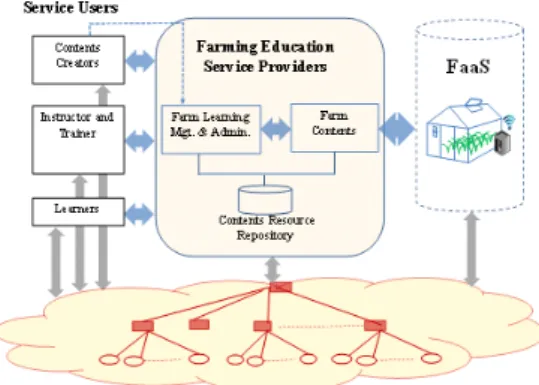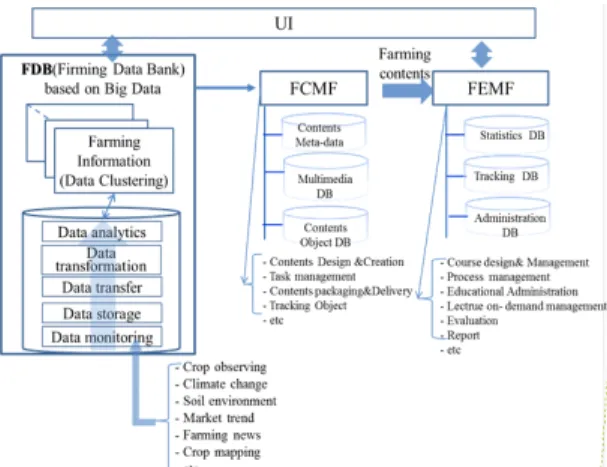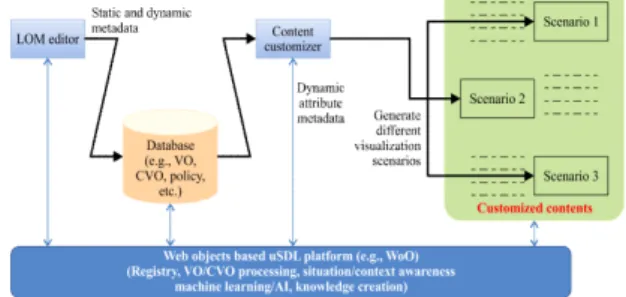한국정보통신학회논문지 Vol. 24, No. 11: 1534~1538, Nov. 2020
ICT 네트워크 기반에서의 스마트 농업 교육 서비스
김동일1*·정희창2
Smart Farming Education service based on ICT Network
DONG-IL KIM
1*· HEE-CHANG CHUNG
21*
Professor, Department of Information and Communication Engineering, Dong-Eui University, Busan, 47340 Korea
2
Expert Engineer, Air Point Co., Ltd, Daejeon, 34025 Korea
요 약
스마트농업 교육 서비스는 농업정보의 확산을 촉진하기 위해 제공되며 농업 정보는 현재의 농업활동, 농산품, 농 지에서의 생산자 경험으로부터 추출된다. 스마트농업 교육은 웹 오브젝트 기반의 자기주도형 학습으로 제공되어 공 간, 장소, 시간에 제약을 받지 않는다. 본 연구에서는 클라우드를 기반으로 하는 학습관리기능과 감시기능, 학습심사 기능 등으로 구성된 스마트농업 교육의 기준 구성도를 제시하여 스마트농업의 확산을 위해 필수적으로 요구되는 스 마트 농업 교육 서비스 기술 표준 및 스마트 농업의 보급 과정에서 필요한 네트워크 기반 참조 모델을 제시 한다.
ABSTRACT
Smart farming education service focuses on the dissemination of farming information that is the farming knowledge, farming skill, and farmer’s experiences and knowhow, etc. This farming information is supposed from current activities, farming product and from the experience of farmer on the field. If the information is not available, or if available and not in a form that is amenable to being brought to the end producer then the process stalls at this point. The core component of the automation process for smart farming education service is the creation of a data store which will be a repository for the information of the smart farming education. The farming sector will benefit immensely from the implementation of farming data in farming contents repository which will serve as the knowledge base for the smart farming education service.
키워드 : 스마트농업, 스마트농업 교육 서비스, 파스, 자기학습유도, 농업학습
Keywords : Smart Farming, Education Service, Faas, ubiquitous self-directed learning, Agricultural Learning
Received 7 August 2020, Revised 19 August 2020, Accepted 29 August 2020
* Corresponding Author DONG-IL KIM(E-mail:dikim@deu.ac.kr, Tel:+82-51-890-1689)
Professor, Department of Information and Communication Engineering, Dong-Eui University, Busan, 47340 Korea
Open Access http://doi.org/10.6109/jkiice.2020.24.11.1534 print ISSN: 2234-4772 online ISSN: 2288-4165
Ⅰ. Introduction
This service focuses on the dissemination of farming Information that is farming knowledge, farming skill, and farmer’s experiences and know how, etc. This information is supposed to current activities, farming product and from the experience of farmer on the field.
And the farm operation service of FaaS is to perform monitoring function and to control devices. Farming education service provides farming contents interacting with farming contents and farming education management function.
The information related to farming knowledge is supposed to current activities, farming product and from the experience of farmer on the field. The core component of the automation process for the smart farming educations is the creation of a data store which will be a repository for the information of the smart farming education. The farming sector will benefit immensely from the implementation of farming data in farming contents repository which will serve as the knowledge base for the smart farming education service[1].
Ⅱ. Conceptual model
Service requirements of Smart Farming Education Service should provide the followings and the concetpual model of smart farming education service is shown as fig.1
- Providing the application function of Farm as a Service(FaaS) should store the data of the farming activities so that farmers can efficiently manage a series of the farming activities, such as distributions of fertilizer/fertility, temperature/water quality, etc.
- Farming Education Services(FES) must be able to analyze the farming education process and classify farming education into each different farming modules and domains or and to provide the smart farming knowledge to be informed by FaaS[2].
- FES describes the importance of farming eduction and evaluation by objectives and the course of farming education
- The flexibility and efficiency in ubiquitous environment based on ICT
- Interactive access of farmers to variety of multimedia based materials
- To get farmer into smart farming knowledges and attitude to adoption of technological change.
- Spreading of education service contents to farmers and disseminating to the farmers the farm contents and perform farmers problem back to education service system for solution.
- To help farmers make decision in farm management.
That is, FES assists farmers to develop proficiency in the management and operation of farms.
- It should be provide self-directed learning service to users(farmers/learners)
And also Farm Management Repository store data clustering according to the type of monitoring data as follows:
- Pesticide information
- Fertilizer information
- Field status such as soil health, diseasea,insect information, plant nutrition
- Weather information such as climate change
- Status of irrigation and water usage
- Work information
Fig. 1 Conceptual diagram of smart farming education service.
Ⅲ. Reference architecture of application model for smart farming education service
The architecture shall be adequate for farmers’
characteristic. An application model for smart farming education service consists of data monitoring function, education service control function, and application connection function in farming as a service of cloud as shown in fig 2.
Fig. 2 Reference architecture of smart farming education service.
Smart farming education service provides context – aware computing and adaptive learning service in Farming Education Service Provider (FESP) and interface with Farm as a Service (FaaS). Farming Education Service Provider(FESP) consists of Farming Education Administration Function(FEAF) and FCF (Farming Content Function). Users interfaces with FESP via Web Object based Service Provisioning Environment. It should satisfy major needs(cost effectiveness, reliability, adapting to the lifestyle, timely sensitive content, adapting to multiple learning styles.)
Education management functional entity (EMFE) executes the administration of the farming education service which manages task specific service and delivery of farming contents. This function entity
performs a variety functions such as handling of academic evaluation, registration, and scheduling education service, and managing guidance of content creation and education procedure[3].
This function manages tasks according to the needs of each users. That is, it performs the function of granting the privilege level according to requesting tasks of each user. Instructor’s tasks produce curriculum about each courses. It produces courses that engage learners into farming education more effectively.
Contents creation tasks prepare well-structured drafts using digital media tool, organizing different learning elements(office files, video, url links, etc), and create the learning contents with effects like a animation, interactive game, quizes, or video rendition of a power point presentation, and their experienced knowhows.
Learning tasks attend agriculture learning services. This service allows learners to choose based on their personal interests. And learners define the learning goals they wish to accomplish farming education, and take ownership of their learning with self-evaluation.
EMFE manages the assembling courses and education assessment course that is to evaluate data from assessments, and develop skills that can improve users performance[4].
Ⅳ. Scenarios for application model of smart farming education service
Smart Farming Education Service could be provided in various ways. The representative service scenarios are described below. This provides example detailed information flows associated with the following service scenarios:
- Agricultural leaning: It provides crop technical information for learning and training to new or existing farmers.
- Content Creation: It provides for farmers to create
contents with the latest updated farming technology information by additionally updating the existing agricultural technology information with the experienced farmer’s know-how.
- New content evaluation: It evaluates and modify the content with crop technology information to be created by assessment of value of basic crop information or new know-how information on farm products, and to upload its to the database and guides learners
To apply Smart Farming based on networks shown in fig 3.
Fig. 3 Smart farming education service based on Networks.
The attributes of educational content objects will characterize functional capabilities of uSDL_VOs in the web objects based uSDL. The web objects based uSDL uSDL_CVOs and uSDL service entities are abstracted by multiple uSDL_VOs. Thus, the functional capabilities of web objects based uSDL will be characterized by the features of attributes. Objects introduced in web objects based uSDL environment are frequently reused, reconfigured and recreated to adapt diverse applications environment in accordance with user’s requirements. Several objects, each which have its own attribute values and its virtualization function in the web objects based uSDL environment, can be used to create another new service resulting in the creation of an original object[5][6].
The operational procedure of web objects based uDSL system is shown in fig 4.
Ⅴ. Service scenario of uSDL for Smart farming
The content model struucture of uSDL comprises the elements: uSDL_ContentObjectProfile, uSDL_Attribute Container, uDSL_ContentObjec tMetadata, uSDL_
Time Fearute and Location. As indicated the WoO platform[ITU-T Y.4452] will support a web environment for dynamic and static metadata processing, and will create a self-directed smart learning service.[7][8].
- Agricultural leaning : It provides crop technical information for learning and training to new or existing farmers creation: It provides for farmers to create contents with the latest updated farming technology information by additionally updating the existing agricultural technology information with the experienced farmer’s know-how.
- New content evaluation : It evaluates and modify the content with crop technology information to be created by assessment of value of basic crop information or new know-how information on farm products ,and to upload its to the database and guides learners.
Fig. 4 Scenarios of the architecture on object tagging and customization of smart uSDL objects.
Ⅵ. Conclusions
Smart farming education service consists of two
functional sector. One is the monitoring and analysis
function of field farming status based on big data for
farmers to increase productivity and efficiency. The data function analyse real time information related to farming such as climate change, soil environment, crop observing status. The other is education function to provide the farming knowledge to farmers. Those are based on cloud is a potentially viable and cost-effective way to facilitate knowledge development among farm professionals and farmers. Smart farming education based on cloud focuses on providing and sharing of farming information and know how that is related to farming knowledge, farming skill, and farmer’s experiences. The learning and training contents related to education is composed from current activities, farming product and from the experience of farmer on the field.
ACKNOWLEDGEMENT
This Work was supported by Dong-eui University Grant (202003610001)
REFERENCES
[ 1 ] Recommendation ITU-T Y.4450/Y.2238 “Overview of Smart Farming based on networks,” Jun. 2015.
[ 2 ] Draft Recommendation ITU-T Y.farms: “The framework and application model for risk mitigation service based on networks,” SG13-TD146-R1/WP3, Jul. 2018.
[ 3 ] Draft Recommendation ITU-T Y.smpp: “Service model for the pre-production stage on Smart Farming,”
SG13-TD147/WP3, Jul. 2018.
[ 4 ] Draft new Recommendation ITU-T Y.sfes: “Smart Farming Education Service based on u-learning environment,”
SG13-TD148/WP3, Jul. 2018.
[ 5 ] Draft New Recommendation ITU-T Y.saic: “Service model of the Agricultural Information based Convergence Service,” SG13-TD149/WP3, Jul. 2018.
[ 6 ] Draft Recommendation ITU-T Y.ISG-fr: “Framework of IoT-based Smart Greenhouse Service,” an output of Question 4/20 meeting, Cairo, May. 2018.
[ 7 ] Proposed new Recommendation ITU-T Y.IoT-SLF
“Frame-work and capabilities for Smart Livestock Farming Based on Internet of Things,” SG20-TD818-R1, May. 2018.
[ 8 ] Contribution, “Internet of Things(IoT) for Smart Water Management and Smart Farming,” SG20-C287-R1, May.
2018.
김동일(DONG-IL KIM)
제 21권 제3호 참조
1991년 9월 ~ 현재 동의대학교 ICT 공과 대학 정보통신공학과 교수
※관심분야 : ICT 융합서비스, ICT 표준화
정희창(HEE-CHANG CHUNG)
1980년 2월 고려대학교 전자공학과 학사 1997년 2월 아주대학교 전자공학과 박사 2000년 4월 한국전자통신 연구원 책임연구원 2014년 6월 한국정보화 진흥원 책임연구위원 2019년 8월 동의대학교 정보통신공학과교수 2020년 현재 ㈜ 에어포인트 전문위원
※관심분야 : ICT 융합서비스, ICT 표준화


